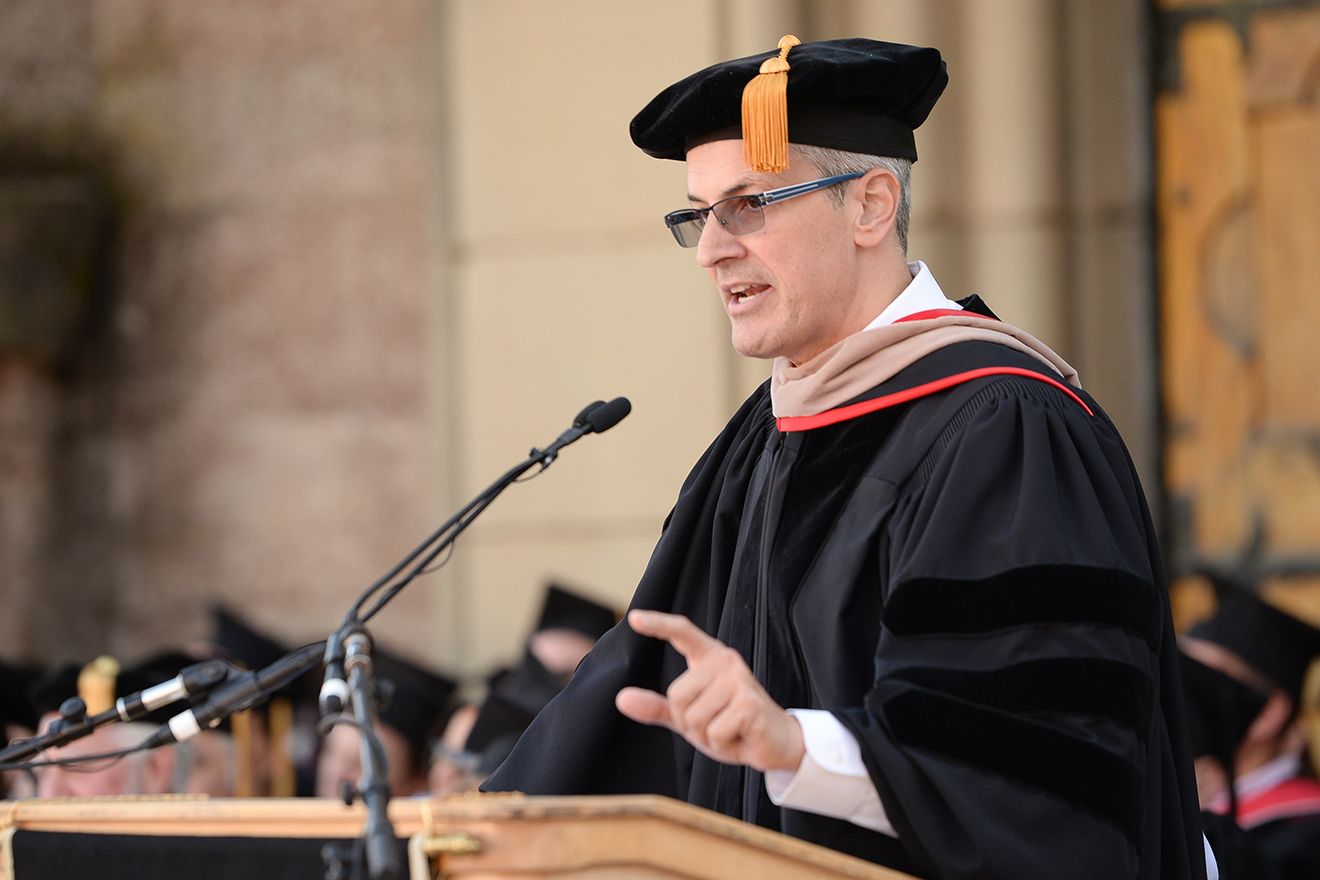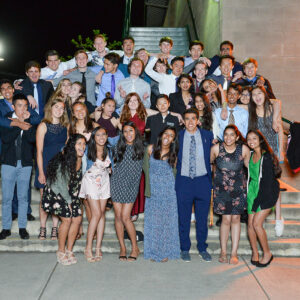This article first appeared in the summer 2017 Harker Magazine.
Good evening. I would like to welcome members of the Board of Trustees, administration, faculty, staff, parents, friends and family, alumni, and the true guests of honor, the graduating Class of 2017. I have the privilege of saying a few words of farewell to our graduates each year. Like most graduation speeches, my talk takes the form of advice, like “Dare to Singletask” or “Love like a Labrador.” Because my talk is the only formality remaining between you and your diplomas, I will continue the tradition of confining my remarks to one page of single-space, size-12 font. But, as always, I will make no promises about the size of my margins. I can tell you that they are indeed marginal.
Today is a special graduation for me because we are in fact graduating together, although I am sure you are graduating with a higher GPA. After 18 years at Harker I will assume the role of headmaster of The American School in Switzerlandthis summer. When I am asked to name one positive thing about moving to Switzerland, I answer that its flag is a real big plus. Even though we are leaving Harker together, its values of lifelong learning, commitment to excellence, and service to others will not leave us. I know, however, that you will be upholding these values with a touch more spring in your step and no gray hair.
Which brings me to the advice I want to share with you today. I have chosen one of my all-time favorite quotes as the cornerstone of my advice – a quote, I believe, that encapsulates everything you need to know about life. I hope I am not overselling it. If I am, you cannot have your money back – or maybe you can, since I am leaving. No, you cannot. The quote comes from the great 18th century Enlightenment philosopher Voltaire. I will break it into two parts, the first half and the second half. The first half is as follows: “Life is a shipwreck …” I know, very inspiring. The original reads as follows: “La vie est un naufrage …” Please excuse my French. “Naufrage” literally means “ship breaking”; think “navigation” and “fracture” joined in one word. I prefer the English “shipwreck” – you know what you are facing with “shipwreck.” A “naufrage” sounds rather nice, like “massage.” “How much is the naufrage and does it involve warm stones?”
When Voltaire says, “Life is a shipwreck,” despite his reputation for satire, I don’t believe he is being completely pessimistic. Think about it – life and shipwrecks have much in common. In both life and shipwrecks, you wind up in places you had not anticipated. For instance, how many of you knew you would be born? Both shipwrecks and life require us to improvise. By saying “Life is a shipwreck,” Voltaire is pointing out that all of us, to a large degree, find ourselves bobbing around on the ocean of life, governed by gale forces that are at best indifferent to our preferences and very much out of our control.
Even though the first half of the quote is about what is out of our control, the second half is about what is within our control. Here is the full quote: “Life is a shipwreck, but we must not forget to sing in the lifeboats.” There you have it – my advice for you today: “Don’t forget to sing in the lifeboats.”I expected that to be more dramatic than it was.
If the first half of the quote is not pure pessimism, the second half is not mindless pap either. I always wanted to use the word “pap” in a graduation speech. “Don’t forget to sing in the lifeboats” means to find joy no matter where you are; to pay attention to those in the lifeboat next to you, even if their presence, like today, is alphabetically determined; to see that circumstances do not necessarily dictate your attitude about those circumstances.
As you may be aware, Mr. Keller, our upper school head, places inspirational quotes at the end of his emails. I often look to see what quote he has placed there. In an uncanny coincidence, as if the universe were conspiring to send the Class of 2017 a common, powerful message, Mr. Keller’s latest quote on his email, after no coordination with me, is the following: “Life is not about waiting for the storm to pass. It’s about learning to dance in the rain.” The parallelisms are uncanny – spooky even. Shipwrecks – singing; storms – dancing.
“Don’t forget to sing in the lifeboats” is also practical advice. We are not saying that success or any specific outcome is certain when you come from a place of joy and appreciation. We are saying that instead of waiting for success from the outside, you can carry success on the inside. Singing in the lifeboats contributes to resilience, an ability to turn lemons into lemonade, something Harker food service does every day.
Remember, Voltaire doesn’t say “Sing in the lifeboats”; that would be too direct. He does not command us to sing, but instead he commands us not to forget to sing. His commanding us not to forget is important. Why? I believe that singing in the lifeboat is our natural state, like the joy children express, a joy we too easily forget. We all forget to sing in the lifeboats. You will forget from time to time. You may have already forgotten today. Given my talk, I would understand.
To close, Marianne Williamson has famously written, “Our deepest fear is not that we are inadequate. Our deepest fear is that we are powerful beyond measure. It is our light, not our darkness, that most frightens us.” To continue to mix metaphors, now is the time to remember your light, to remember to sing in the lifeboats. Like Troy and Gabriella sang in our own 2017 production of “High School Musical”: “We’re soarin’, flyin’/There’s not a star in heaven/That we can’t reach.” If you “Don’t forget to sing in the lifeboats,” you will not only be a light unto yourself but a light unto the universe as well. Thank you and congratulations to you all.









